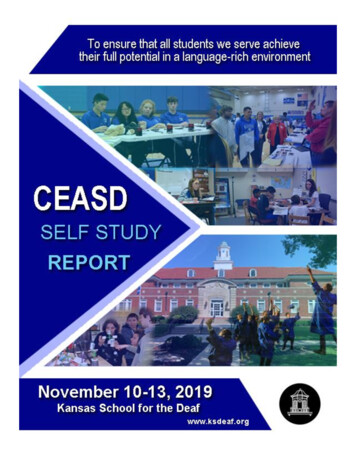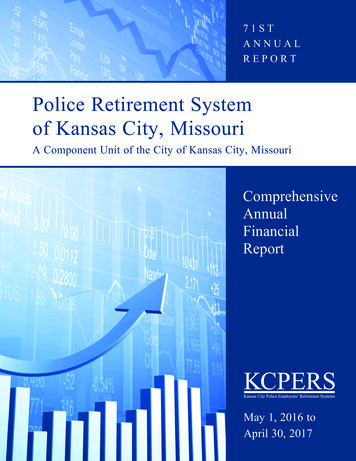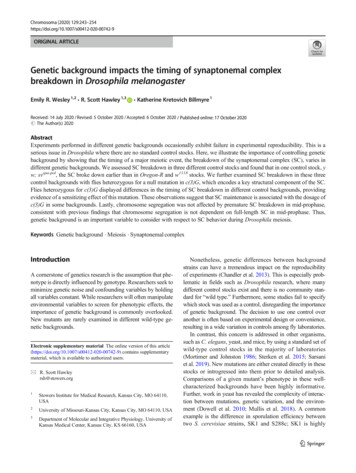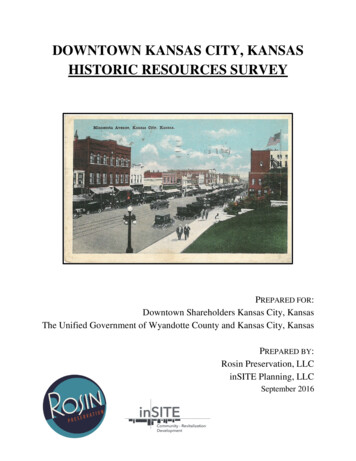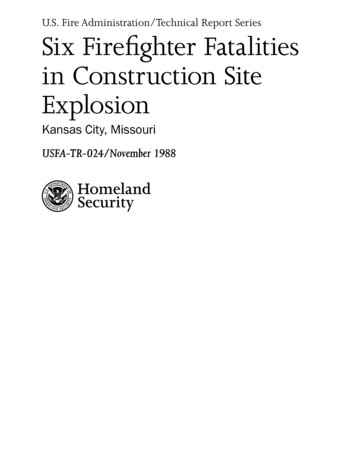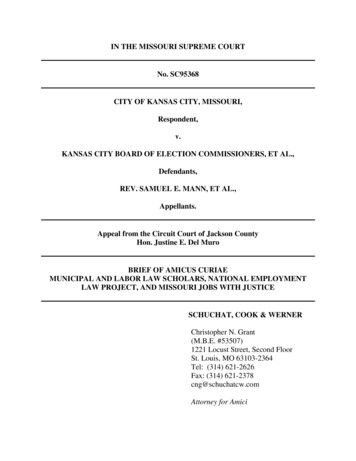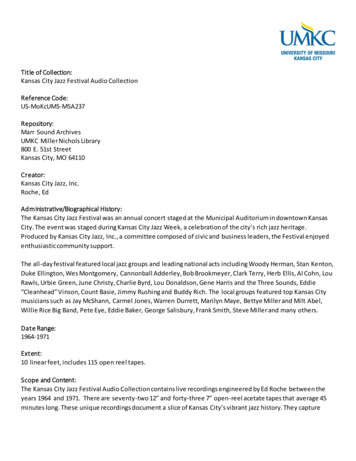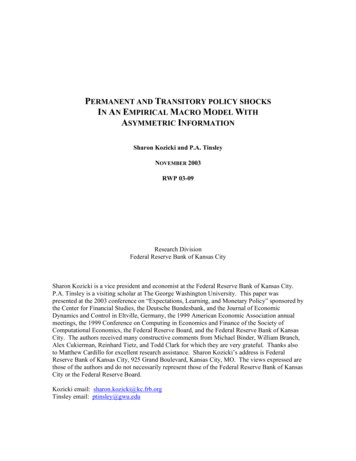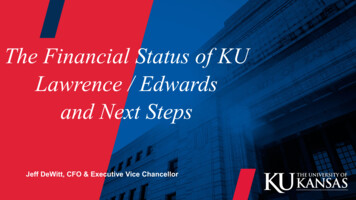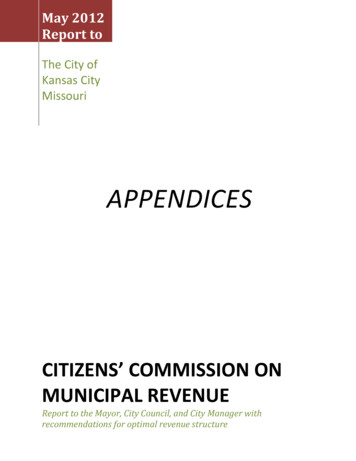
Transcription
May 2012Report toThe City ofKansas CityMissouriAPPENDICESCITIZENS’ COMMISSION ONMUNICIPAL REVENUEReport to the Mayor, City Council, and City Manager withrecommendations for optimal revenue structure
Appendix ACommission MembersChairwoman Susan Stanton has held senior executive positions in both the public and privatesector including President and Chief Operating Officer of Payless Cashways, a Fortune 500company. Ms. Stanton served as Interim President and CEO for the United Way of Greater KansasCity and KCPT-Channel 19, as well as Vice President of H&R Block and the Ewing Marion KauffmanFoundation. She began her career serving as Director of Administration and Chief Operating Officerfor Jackson County, Missouri. A life-long Kansas City resident, Ms. Stanton has served on numerousboards and commissions and holds a master’s degree from the University of Texas. She hascompleted executive programs at both Harvard’s Kennedy School of Government and the WhartonSchool at the University of Pennsylvania.Commission Member Rev. Thomas Curran is the President of Rockhurst University. FatherCurran is an ordained Roman Catholic priest and previously served as Vice President of RegisUniversity in Denver where he was responsible for the University’s annual fund and capitalcampaign. He has served on the Board of Directors for the Civic Council, the Midwest ResearchInstitute, and the Association of Catholic Colleges and Universities.Commission Member Steve Glorioso is a professional political and media consultant with local,national and international experience. Mr. Glorioso served as Chief of Staff to Mayor Barnes and hasserved on many City Boards and Commissions including the Commission for Kansas City TaxReform. Mr. Glorioso received degrees from Villanova University (BA) and University of Missouri atKansas City (MA).Commission Member Kathleen Hauser is with the law firm of Lathrop & Gage LLP. She practicesprimarily in real estate and local government matters. Previously Ms. Hauser served in the CityAttorney's office for over 20 years and served as City Attorney for the City of Kansas City duringMayor Cleaver's term. During her tenure with the City she provided legal services to a number ofCity Boards and Commissions. She attended Avila University and the University of Missouri-KansasCity School of Law.Commission Member Tim Kristl is President of Mitchell, Kristl & Lieber, P. C., a local law firm andcurrently serves as an Executive Board Member of the Clay County Economic Development Council.He is a former Chair of the Kansas City Tax Increment Financing Commission and a former memberof the Board of Parks and Recreation Commissioners, appointed in 1999 by Mayor Kay Barnes. Heserved on the Board for eight years, two as Board President. Tim earned his Juris Doctor and hisbachelors of Business Administration from Notre Dame, and his L.L.M. in Taxation from theUniversity of Missouri-Kansas.Commission Member Gregory Lever is the Business Development Manager of Taliaferro &Browne, Inc., with an extensive history in working for municipal interests, including on the staff ofMayor Cleaver. Mr. Lever is the former Executive Director of the Regional Transit Alliance. He hasreceived a Lifetime Board Member Award from the Avila University Alumni Association Board ofDirectors, where he received his B.A. in Political Science.Page A-1
Commission Member Merley McMurry is the Governmental and Community Affairs BusinessManager for Kansas City Power & Light. Prior to joining KCP&L, she served as Vice President ofMember Services and Strategic Initiatives for the Greater Kansas City Chamber of Commerce forover 15 years. A life-long resident Kansas City, Mrs. McMurry is active in the Santa FeNeighborhood Association and has held leadership positions at the Grandview Chamber, the SouthKansas City Chamber of Commerce, the Urban League, the Guadalupe Center and Kansas City’s WetWeather Panel. She holds a bachelor’s from the University of Missouri and a master’s from CentralMichigan University.Commission Member Dr. Brent Never is an Assistant Professor in the Department of PublicAffairs in the Henry W. Block School of Management at the University of Missouri- Kansas City, andis actively involved in nonprofit service and collaboration in the nonprofit sector. Dr. Neverreceived his Doctorate from Indiana University at Bloomington in Public Policy, and as a two-timeFullbright Scholar most recently attended the University of Ulster in Northern Ireland.Commission Member Donna Wilson Peters is an attorney at the Husch Blackwell law firm. Shewas formerly Vice President and General Counsel for Kauffman Scholars, Inc. and previously servedin the real estate and public law department of Polsinelli Shalton Welte Suelthaus PC in Kansas City.Mrs. Peters is chairperson of the Kansas City Downtown Minority Development Corporation, andserved as Secretary/Board Attorney for the Kansas City Board of Police Commissioners and on theKansas City Landmarks Commission. She began her career in the office of Congressman Alan Wheatafter receiving her bachelor’s, and then received her Juris Doctorate from Howard University.Commission Member Wayne Powell is the Vice President and Chief of Staff of Blue Cross BlueShield of Kansas City. Mr. Powell previously served as Assistant Vice President of the FederalReserve Bank of Kansas City and as the Assistant Secretary to its Board of Directors. He serves asthe Board of Directors Vice President for the Hope Leadership Academy Charter School and on theboard of NonProfit Connect. Mr. Powell received his B.A. in Political Science from GettysburgCollege, his master’s from the University of Michigan, and received his Executive Education fromthe Booth School of Business at the University of Chicago.Commission Member Jeanette Prenger is President of ECCO Select, a Kansas City humanenterprise solutions provider. She is the Chair of Junior Achievement of Mid America, recentlyappointed to the Latino Coalition, and serves on the United Missouri Bank Board of Directors.Among her service on boards on some of Kansas City’s most prominent civic organizations, Mrs.Prenger serves as a Trustee for the United Way of Kansas City and Park University.Commission Member Jim Rice is Senior Associate for Planning and Development at NorthlandNeighborhoods, Inc. Mr. Rice has forty-seven years of government and health care managementexperience. He served as Executive Assistant to Mayor Berkley after serving at Truman MedicalCenter and the City Manager's office in Kansas City. In 1970, Mr. Rice became the first Assistant tothe City Council in the history of Kansas City. He served for 23 years as Vice President, CommunityAffairs for Health Midwest before joining Northland Neighborhoods. Mr. Rice holds a Master'sDegree in Public Administration from the University of Missouri-Kansas City.Page A-2
Commission Member James Stacy directs special real estate projects and community relations forDST Systems, Inc. Prior to joining DST, Mr. Stacy was the Founding President and CEO of LionessRealty Group and MC Lioness Realty Group. He is a member of the KC Metro and NationalAssociation of Realtors. Mr. Stacy has served as Alumni Board President and as a Regent ofRockhurst University, Board President of the Broadway Westport Council, board member ofOperation Breakthrough, Brush Creek Community Partners and Christmas in October among othercivic boards and associations.Commission Member Reginald Thomas is the President and Business Manager of the Kansas CityLocal Laborers Union #264, has had a long history of working for Local and National Labororganizations as well as worker advocacy. He has served as Chairman of the Laborers Health andWelfare Fund, President of the Construction Benefits Audit Corporation and Executive BoardMember and Delegate to the AFL-CIO District Council.Commission Member Peter Yelorda served as the Executive Vice President and Chief CommunityAffairs Officer for Blue Cross and Blue Shield of Kansas City. Mr. Yelorda previously served asAssistant City Manager for the City of Kansas City under Mayor Cleaver. In his 26 years of publicservice he has served on the UMKC Board of Trustees, Chair of the Jazz District RedevelopmentCorporation, chairperson for the Full Employment Council and Chair of the TIF Commission. Mr.Yelorda earned an undergraduate degree from Eastern Michigan University and a master's degreefrom the University of Michigan.Page A-3
Appendix BCharter StatementThe Citizens’ Commission on Municipal Revenue will analyze the City’s current revenuestructure and provide the Mayor and City Council with innovative recommendations to improvethe City’s long-term financial position. The Commission’s recommendations will focus ondesigning an optimal revenue structure that will ensure growth, fund basic services, and enablethe City to fund dynamic projects.Issues for considerationWhen examining the City’s various revenue sources, initial questions for the Commission’sconsideration should be similar to those of the original Commission, outlined below. However,these are not exclusive, and the Commission should use them as guideposts to address additionalrevenue issues it identifies as most significantly affecting the economic health of the City. What did this source of revenue represent in terms of dollars during the last fiscal year?What percentage of the total revenues of the city did this amount to?Has this source of revenue increased proportionately with the growth of the City or has itlagged behind or gone ahead of the growth?Is this source of revenue difficult to collect?Is this source of revenue expensive to collect?What are the costs of collection of this source of revenue, dollars and percentages?Is there a sound legal basis for this source of revenue?Is this source of revenue accepted by the public or resented, or is there general attempt madeat avoidance?In the event of future growth of the City, will the source of revenue increase proportionately?In the event of future serious inflation, with source of revenue increase with inflation?In the event of deflation, will this source of revenue decrease faster or slower than thegeneral deflationary movement?Does this source of revenue tend to keep people or businesses from moving into Kansas City,and does it tend to cause people and businesses to move out of Kansas City?Would an increase in the rate of this revenue have any substantial effect on people orbusinesses moving into or out of Kansas City?Would a decrease in the rate of this source of revenue have any effect on people orbusinesses moving into or out of Kansas City?From your examination of the source of revenue, is it fairly enforced and levied, or are therediscriminatory factors in its levy and its collection that should be remedied?If this source of revenue is a direct charge for services, is it an adequate charge and does itbear any relation to the costs of the services?Is this source of revenue in use in other cities of our size?If so, does it bear a similar relationship to the tax structure of other cities:o Is it a smaller factor in the tax picture?o Is it a larger factor in the tax picture?Who finally pays this source of revenue?What is the general economic impact of this revenue?Page A-4
Appendix CRevenue Policy DraftCity of Kansas City, MissouriRevenue Policy(a)Policy.It is the policy of the city to maintain a revenue system that meets the city’s immediate andlong-term service delivery needs, protects the city’s creditworthiness, and follows bestpractices for administration and collection. The city’s revenue policy is the officialguideline to be used by the City Council and city management in conjunction with thecity’s budgeting and financial planning efforts.(b)Authority.Authority to execute and manage the collection and administration of the city’s taxes, feesand assessments is derived from the Missouri Constitution, Revised Statutes of Missouri,Charter of Kansas City Missouri, and Kansas City, Missouri Code of Ordinances.Management responsibility for the city’s revenue policy is hereby delegated to the Directorof Finance.(c)Scope.The revenue policy shall be inclusive of all revenue sources of the city. The policyincorporates recommended best practices of the Government Finance Officers Association(GFOA) and the National Advisory Council on State and Local Budgeting (NACSLB).(d)Objectives.(1) To establish policies for reviewing existing and potential revenue streams.(2) To maintain a revenue structure that meets the operational and capital requirements ofthe city.(3) To set basic guidelines for revenue sources other than taxes and fees.(4) To establish review processes that provide early warning signals regarding revenuefluctuations.(5) To create a structure that is fair, equitable and sufficiently attractive for business andresidents.(e)Revenue Structure.The city shall consider, at minimum, the following seven characteristics when weighingany changes to its revenue structure or when evaluating the continued levy of any tax.Dependability shall be the city’s primary review consideration followed closely by equityPage A-5
and diversity. Other characteristics including potential for growth, renewal periods,dedication and ease of administration shall be considered secondary.(1) Dependability. The city shall include taxes and fees in its revenue structure thatproduce a consistent level of revenue from period to period.(2) Equity. The city shall consider the fair distribution of tax burden on businesses andresidents when considering new, renewing and continuing revenue sources.Horizontal and vertical equity should be considered when evaluating the distributionof taxes.3) Diversity. The city shall strive to maintain a diversified mix of taxes and fees toprotect it from short-term fluctuations in any of its various revenue sources. The cityshould also support economic policies designed to attract businesses that grow andincrease the diversity of its tax base.(4) Growth. The city shall seek to include revenue streams in its mix of taxes and feesthat grow over time at a rate that exceeds the rate of inflation.(5) Renewals. In order to reduce volatility, the city shall strive to limit both the dollaramount and number of taxes and fees subject to renewal periods of 10 years or less.Any newly authorized revenue stream with a sunset ideally shall not be used to fundrecurring service delivery costs.(6) Dedicated/Non Dedicated Revenue. Whenever possible, the city shall not dedicate arevenue stream to a specific use or program. Dedication or earmarking of revenuestreams does not allow the city to respond to changing economic conditions or serviceexpectations and is dispositive to the city’s general credit.(7) Ease of Administration. The city revenue mix should facilitate taxpayer complianceand be applied uniformly. Efficiency in administering taxes and fees should also beconsidered including source and cost of collection.(f)Revenue Estimates.(1) Revenues estimates shall be prepared annually using an objective and analyticalapproach based on local, regional and national economic trends and their impact onrevenue. This process should assist the city in achieving consensus on revenueestimates for the budget.(2) To assist in determining if current programs and service levels can be sustained in thefuture and to identify potential problems that need to be addressed, the city shouldalso prepare multi-year revenue projections. The forecast period should be three tofive years.(3) The city should maintain an in-depth understanding of its major revenue sources toboth decrease potential gaps between revenue estimates and actual collections andevaluate potential changes to revenue source rates and bases.(4) The city should periodically estimate the impact of potential foregone revenue due topolicies that exempt certain taxpayers or service users from fee or tax payments,provide discounts or credits or otherwise favor particular categories of taxpayers orPage A-6
(5)(6)service users and any proposed federal, state and local legislative requests impactingtaxes and fees.The city shall prepare and maintain a revenue manual that documents revenue sourcesand factors relevant to present and projected revenue collections.The city should evaluate revenue and expenditure options together, includingredirection of tax revenue, and consider the implications for other financial indicatorsprior to making specific choices with regard to the proposed budget.(g) One-Time and Unpredictable Revenue.One-time, limited term resources or unpredictable revenue such as proceeds from assetsales, debt refinancing, one-time grants, legal settlements, revenue spikes, budget savingsand similar nonrecurring resources shall not be used for current or new ongoing operatingexpenses. Appropriate uses of one-time and unpredictable include building andmaintaining the unallocated reserves in the general fund or other city funds, the earlyretirement of debt, capital improvements, or capital maintenance expenditures and othernon recurring expenditures.(h)User Fees and Service Charges.(1) For services that benefit specific users rather than the community as a whole, the cityshall establish and collect fees to recover the costs of those services so long as thecost of collection from specific users is not burdensome to the city.(2) User fees and charges should reflect the service costs. Components of the user chargeshall include operating and capital costs, as well as the direct and indirect costs ofproviding the service. Full cost charges shall be imposed unless it is determined thatpolicy, legal, hardship on specific users, or market factors would suggest lower fees.(3) In circumstances where full charges are not imposed, non residents shall pay the fullcost charge to minimize the tax burden on city residents so long as the cost ofcollection from non residents at a different rate is not burdensome to the city.(4) User fees shall not exceed the full cost of providing the service.(5) Fee increases must be approved prior to or at the time of the adoption of the budget.(i)Intergovernmental Revenue.(1) The city will seek available state and federal grants unless conditions attached to theassistance are contrary to the city’s interests.(2) The city will avoid using grants to meet ongoing service delivery needs. The cityshall review all grant requirements to ensure any grant awarded funds assist the cityin fulfilling its primary goals and objectives.(3) Grants awarded to the city shall be considered unfunded mandates if the awardceases. Unfunded mandates will undergo review in the context of the city’s budgetprocess to determine how well they continue to fulfill the city’s primary goals andobjectives and if general municipal funds are warranted for continued support.(4) The city will budget expenditures for grant funded programs after receipt of the grantaward.Page A-7
(j)Parking Fees.Hourly, daily, and monthly contract rates for city-owned parking facilities, meters, etc.shall be reviewed and, if necessary, adjusted annually to reflect market prices of privatelyowned parking facilities and location of those facilities. Fee adjustments shall also considerdowntown objectives, such as development incentives, space availability, businesspromotion, traffic control, and mass transit patronage.(k)Fines and Forfeitures.Fines shall be set according to legal guidelines, deterrent effect, administrative costs andrevenue potential.(l)Enterprise Operations.(1) User charges for enterprise services such as airports, water, sewer, and stormwatershall be set at rates sufficient to finance all direct and indirect operating, capital,reserve/working capital and debt service costs. Rates will be set such that theseenterprise funds are not in a cash deficit during the year and so that debt covenantsand reserve policy requirements are met.(2) The general fund will assess an administrative service charge for overhead expensesand general government services provided to the enterprise activities.(m) Pooled Investment Portfolio Interest Earnings Allocation.(1) It shall be the policy of the city to allocate pooled investment portfolio interestearnings (interest earnings) in a manner that best serves the interests of the cityconsistent with applicable laws, ordinances, bond covenants and contractualcommitments.(2) For funds with legal or contractual requirements, interest earnings will be distributedmonthly in arrears proportionate to each funds ending cash balance for the previousmonth compared with the total cash balances of all funds in the pooled investmentportfolio. Absent a clear mandate to the contrary, interest earnings will be credited tothe general fund. The director of finance or his/her designee shall be responsible forbudget preparation and execution of the annual interest earnings allocation.(3) To support the costs of managing the city’s pooled investment portfolio, the directorof finance may charge a management fee to funds participating in the investmentpool. The management fee would be stated as a percentage of the interest earningsand deducted from the interest earnings prior to any allocation. Such percentagewould be calculated annually so as to fully recover all costs relating to pooledinvestment operations including staff time, safekeeping, analysis tools, subscriptionsand other costs.Page A-8
Appendix DAcknowledgementsWe thank Mayor Sylvester James Jr. for the invitation to serve on this importantcommission and for his input to, and support of, our work. We thank City Manager TroyShulte, and in particular want to acknowledge his staff whose dedication, in-depthknowledge, organizational expertise, and presentation skills were critical to theCommission’s understanding of these complex issues:Director of Finance Randall LandesAssistant City Attorney Stephen WalshDeputy Director of Finance Wanda GunterCity Treasurer Tammy QueenCommissioner of Revenue Mari RuckManager of Administration & Analysis Cemal Umut GungorDevelopment Finance Manager Dan BagunuWe thank the City Council members, other city staff, and business and civic leaders whotook time to participate in panel discussions, providing the Commission with criticalinformation to guide our decisions (listed in order of meeting date):Councilwoman Jan Marcason, 4th DistrictMayor Pro Tem Cindy Circo, 5th District At-LargeCouncilman Jim Glover, 4th District At-LargeCouncilman Russ Johnson, 2nd districtFrank Lenk, Mid-America Regional CouncilCouncilman John Sharp, 6th DistrictKen Hager, Greater Kansas City Chamber of CommerceDan Cofran, former City CouncilmemberMike Burke, former City CouncilmemberMark McHenry, Director of Parks and Recreation, Kansas City MOTom McDonnell, DST Systems, Inc., representing Advance KCMadeline Romious, AT&T, Inc., representing Advance KCJohn Bluford III, President/CEO, Truman Medical CenterLandon Rowland, Chair of the Kansas City Health CommissionDr. Rex Archer, Director of Health, Kansas City MOThe Commission thanks the Kauffman Foundation for use of its facilities for regularmeetings, as well as the City of Kansas City Parks Department and the Northland RegionalChamber of Commerce for hosting two public hearings.Page A-9
Appendix ETax Burden ComparisonThe District of Columbia prepares an annual study comparing its tax burden with that ofthe largest city in each state.1 The study measures state and local tax burden for a family ofthree (two wage earning adults and a school-aged child) across five income levels. The fourmajor taxes used in the comparison are income, property, sales and use tax, andautomobile taxes. The tables below show results for Kansas City and rankings of peer citiesincluded in the study. A rank of 1 indicates the highest tax burden, 51 the lowest.ESTIMATED BURDEN OF MAJOR TAXES FOR A FAMILY OF THREE, 2010 Income 301,634BurdenAmount ,7419.8%Tax Burdens – Kansas City and Peer CitiesYear20092010125,000Kansas CityDenverMemphisMilwaukeeMinneapolisOklahoma CityOmaha8192438222539Kansas CityDenverMemphisMilwaukeeMinneapolisOklahoma CityOmaha723243621344150,000 75,000 100,000 4611163518“Tax Rates and Tax Burdens in the District of Columbia – A Nationwide Comparison, 2010”. (2011).Page A-10
Appendix FSummary of Financial Model ResultsGeneral Municipal ProgramsGeneral Fund Supported ProgramsPersonal ServicesContractual ServicesCommoditiesCapital Outlay/EquipmentPass Through PaymentsDebt ServiceCapital ImprovementsContingent AppropriationDedicated Revenue Fund ProgramsPersonal ServicesContractual ServicesCommoditiesFY2013-14Capital Outlay/EquipmentPass Through PaymentsDebt ServiceCapital ImprovementsAssessment ProgramsGeneral Municipal Expenditures *AVG Expenditure Growth Bonds to cover Mayor's planGeneral Municipal Expenditures *AVG Expenditure Growth 1Billion Debt ProgramGeneral Municipal Expenditures *AVG Revenue Growth 1,400,000,000 1,300,000,000 1,200,000,000 1,100,000,000 1,000,000,000 900,000,000 800,000,000 700,000,000 600,000,000 500,000,000General Municipal Expenditures (GME) by Program696,286,301 308,109720,743,678 1,979,13873,370,8127,062,037FY2022-23672,658,849 195,853FY2021-22649,833,160 087,407FY2020-21627,782,028 982,640FY2019-20606,479,168 881,429FY2018-19585,899,189 83,652FY2017-18566,017,561 89,193FY2016-17546,810,588 97,939998,735,713 1,017,816,764 1,053,568,047 1,090,575,110 1,128,882,062 1,168,534,565 1,209,579,879 1,252,066,93027,859,300 35,174,050 42,633,750 50,233,700 57,983,675 62,957,200 63,588,325 ,630,4532,509,782964,845,085 20,688,025 FY2014-15932,104,485 13,655,000 985,533,110 1,026,595,013 1,052,990,814 1,096,201,797 1,140,808,810 1,186,865,737 1,231,491,765 1,273,168,204 1,316,292,780FY2013-14 945,759,485 2-23Avg HistoricalRevenue GrowthAvg HistoricalExpenditure GrowthHistorical Exp Growth 1 Billion Bond Program986,872,463 1,015,346,904 1,044,642,924 1,074,784,229 1,105,795,207 1,137,700,951 1,170,527,279947,411,976 FY2016-17General Municipal Expenditures974,747,856 920,842,706 FY2015-16 FY2014-15Page A-11
Appendix GEarnings Tax Rate ComparisonsPage A-12
Appendix HSales Tax Rate ComparisonsKansas City Missouri and Surrounding CommunitiesCalendar Year 2011 Sales Tax Rates10%9%8%average7%6%5%4%3%2%1%0%Page A-13
Appendix IProperty Tax Rate ComparisonsEqualized TOTAL Property Tax Mill ComparisonsMetro Area Cities2.52average1.510.50Equalized CITY ONLY Property Tax Mill ComparisonsPeer Cities10.90.80.70.60.5average0.40.30.20.10Page A-14
Appendix JUtility Tax Rate ComparisonsPeer CityMilwaukee, WIOmaha, NEKansas City, MODenver, COMinneapolis, MNFt. Worth, TXOklahoma City, OKSt. Louis, MOTulsa, OKMemphis, TNElectric TaxNatural GasSteam TaxCable %7.50%5%5%Page A-15
Appendix KBusiness License Fee ComparisonsPage A-16
Appendix LEmployee, Debt, Service Level ComparisonsEmployee ComparisonsPeer CityKansas City, MODenver, COFt. Worth, TXMemphis, TNMinneapolis, MNOklahoma City, OKOmaha, NESt. Louis, MOTulsa, Employeesper 1,000 PopPolice1,3692,17415Employeesper ervice Level ComparisonsPeer CityUtilitiesAirportHealth DeptLibraryDirect Debtas as % ofPropertyValue2.35.1OverlappingDebt as a %of PropertyValue5.07.8PublicTransitZooKansas City, MODenver, COFt. Worth, TXMemphis, TNMinneapolis, MNOklahoma City, OKOmaha, NESt. Louis, MOTulsa, OKDebt Level ComparisonsPeer CityNational MedianKansas City, MODenver, COFt. Worth, TXMemphis, TNMinneapolis, MNOklahoma City, OKOmaha, NESt. Louis, MOTulsa, OKDirect DebtPer CapitaOverlappingDebt PerCapita 1,948 3,310 3,311 5,028Debt Serviceas a % ofExp's15.323
Weather Panel. She holds a bachelor's from the University of Missouri and a master's from Central Michigan University. Commission Member Dr. Brent Never is an Assistant Professor in the Department of Public Affairs in the Henry W. Block School of Management at the University of Missouri- Kansas City, and
